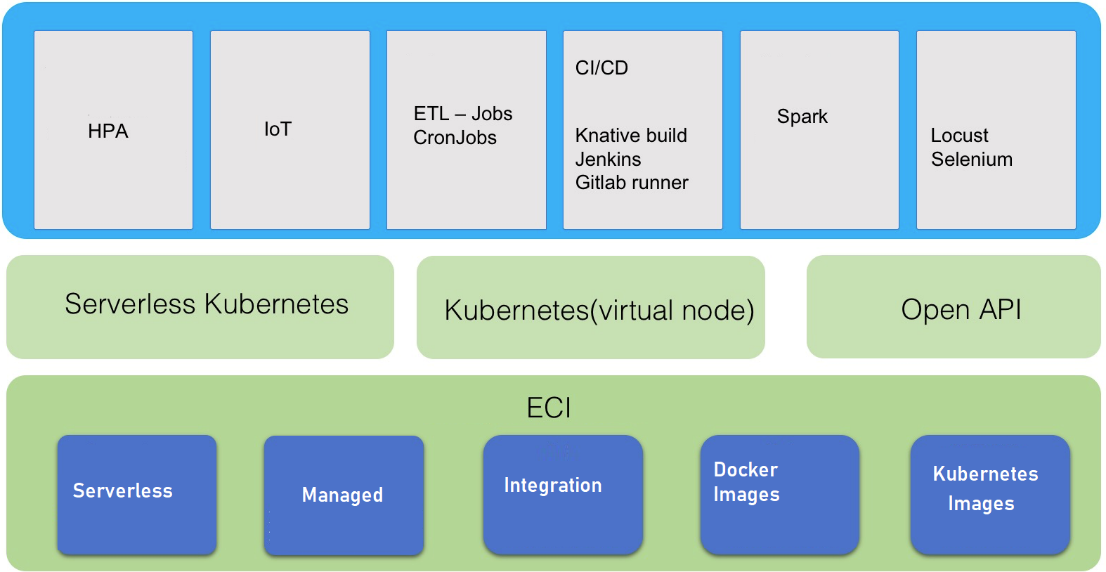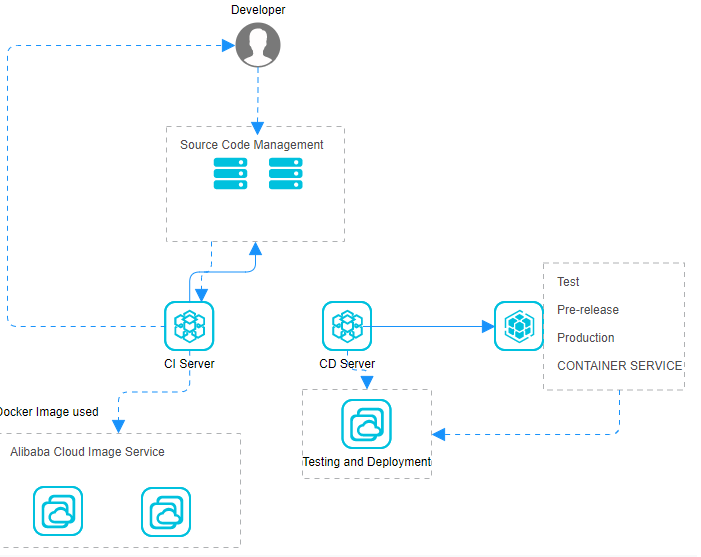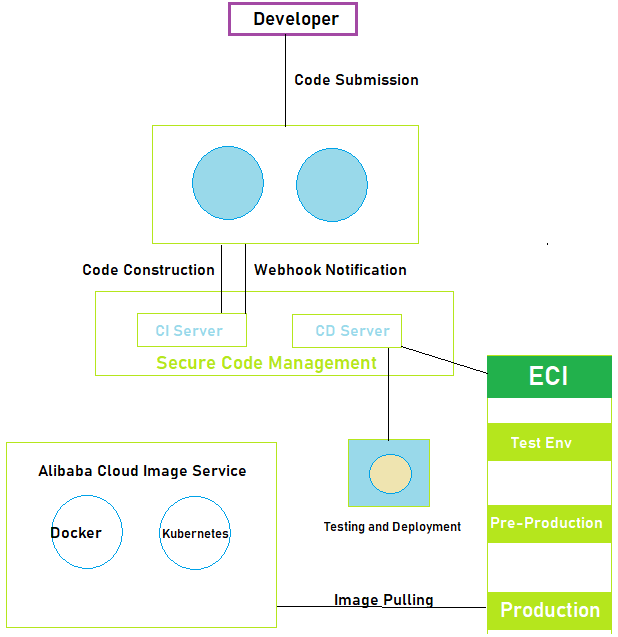By Shantanu Kaushik
Containers have been around for some time now. Containers have enabled a far easier approach to application execution across environments. Containers pack all of the dependencies to run applications without any issues. Alibaba Cloud Container Service for Kubernetes (ACK) was created for reliable containerization of applications at an enterprise level. Alibaba Cloud extends support for Docker as well.
Implementing microservices using Alibaba Cloud is also extremely efficient. You have the liberty to use your tools or call for APIs using the API Gateway. Alibaba Cloud has enabled deep integration of services across environments. Alibaba Cloud has been a frontrunner in adapting to the latest technological advancements and innovating to support the IT industry.
Following the serverless architecture, Alibaba Cloud created the Elastic Container Instance (ECI). In this article, we will discuss how Alibaba Cloud ECI is revolutionizing fully-managed serverless architecture.
Alibaba Cloud Elastic Container Instance (ECI) helps run containers without dedicating resources to manage your backend server or the architecture. Alibaba Cloud ECI follows the agile practices and provides a highly secure service to enable quick deployment of containers using images.

Elastic Container Instance (ECI) uses the industry-leading Elastic Compute Service (ECS) infrastructure, accounting for elasticity, scalability, and reliability. Alibaba Cloud ECI has a shorter deployment time. You do not have to spend time configuring or purchasing infrastructure since you can directly deploy using a container image.
Alibaba Cloud ECI is deeply integrated with the Container Service for Kubernetes (ACK) and enables serverless Kubernetes. You can directly deploy using the provided console with support to numerous software development kits (SDKs) and tools for faster connection to your existing business system. ECI also allows for connection to your Kubernetes cluster using Virtual Kubelets to manage traffic surges.

Security is important. To address that, Alibaba Cloud ECI features multiple security-based optimizations that ensure isolation by design. By default, containers are deployed in sandboxes and are exclusive to the application stored within it. Physical resource security and management is handled by Alibaba Cloud, ensuring the safety and security of your data.
Alibaba Cloud ECI makes use of Elastic Compute Service (ECS) security groups. These ECS security groups are used to control inbound and outbound traffic. One of the benefits of Alibaba Cloud integration is the capacity to use your ECI instance security policies with your ECS instances.
Alibaba Cloud ECI uses Resource and Access Management (RAM) for authorization roles and to control identity and access needs throughout the entire system, making the use of ECI a highly secure and controlled one.
The serverless computing model was set up to provide dynamic orchestration of resources without managing any infrastructure. These resources are automatically scaled depending on demand. Alibaba Cloud ECI leverages the serverless architecture, so you only need a container image to enable the service. All dependencies related to infrastructure are automatically managed and orchestrated to create and maintain the container service.
You can sit back and focus on business values and other necessary innovations, while Alibaba Cloud ECI provides everything to maintain uninterrupted service.
Alibaba Cloud Elastic Container Instance (ECI) has integrated support from all other Alibaba Cloud products and services including, Alibaba Cloud Storage NAS, cloud disks, log service, and Alibaba Cloud ARMS (Application Real-Time Monitoring Service).
Alibaba Cloud ECI supports fine-grained application scaling. It uses the Horizontal Pod Auto-Scaler (HPA) service associated with Kubernetes to automatically adjust the resources based on traffic demands. If you have already deployed using the Container Service for Kubernetes (ACK), you can leverage faster scale-out, efficient resource usage, and better reliability by deploying an application and distributing it over ECIs and ECS instances.
To maintain high-availability, Alibaba Cloud ECI maintains the pre-specified number of ECS nodes during scale-in and scale-out.
Alibaba Cloud Elastic Container Instance (ECI) can be directly integrated with the DevOps continuous integration or continuous delivery (CI-CD) process. Since ECIs can be created or deleted at any time, it helps the overall DevOps pipeline to automatically deploy containers, run test cases, and deploy packaged applications.
This makes Alibaba Cloud ECI a remarkable solution to provide a large-scale implementation for continuous testing with the CD-CD pipeline. ECI enables CPU or GPU optimized resources and can provide a large number of concurrent jobs, which makes it a perfect solution for stress testing, simulations, and application packaging.
Alibaba Cloud ECI can trigger different testing scenarios after code submission since it is deeply integrated within the CI pipeline. Let’s take a look at the information flow for this scenario on the chart below:

Alibaba Cloud ECI is fully compatible with Spark and Presto with Kubernetes. You don’t need to alter their ecosystem before utilizing it, making it a default utilization scenario. ECI allows you to configure a large number of concurrent jobs. ECI provides another step forward in productivity by utilizing multiple processing nodes in a short time for AI and big data processing.
Containerization has solved a lot of problems with application deployments. The current trends suggest an extensive development cycle related to containers alongside management engines, such as Kubernetes and Docker, aging and evolving further. Alibaba Cloud has made it possible to provide a seamless and highly reliable solution to run container instances directly without any resource management with its serverless computing.
In the next article of this two-part series on Alibaba Cloud Elastic Container Instance (ECI), we will discuss ECI and Kubernetes. The topics include the usage of ECI with serverless Kubernetes and ECI with Container Service for Kubernetes (ACK). We will present the usage scenarios associated with this application and list some of the best practices associated with the Elastic Container Instance (ECI).
Empower Online Businesses with Alibaba Cloud Anti-DDoS, WAF, CDN and Cloud Firewall

2,593 posts | 791 followers
FollowAlibaba Clouder - January 4, 2021
Alibaba Clouder - July 15, 2020
Alibaba Cloud Serverless - April 21, 2022
Alibaba Container Service - April 11, 2019
Alibaba Cloud Community - March 8, 2022
Alibaba Container Service - October 21, 2019

2,593 posts | 791 followers
Follow API Gateway
API Gateway
API Gateway provides you with high-performance and high-availability API hosting services to deploy and release your APIs on Alibaba Cloud products.
Learn More Microservices Engine (MSE)
Microservices Engine (MSE)
MSE provides a fully managed registration and configuration center, and gateway and microservices governance capabilities.
Learn More DevOps Solution
DevOps Solution
Accelerate software development and delivery by integrating DevOps with the cloud
Learn More Alibaba Cloud Flow
Alibaba Cloud Flow
An enterprise-level continuous delivery tool.
Learn MoreMore Posts by Alibaba Clouder